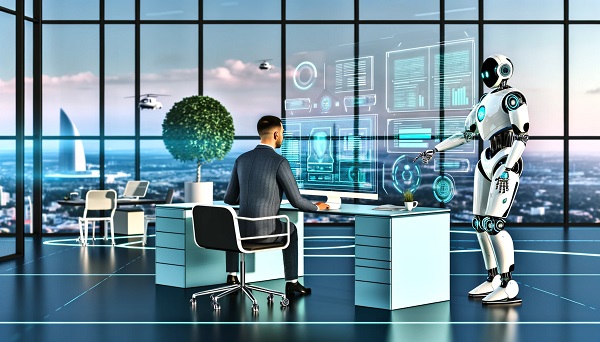
AI vs. Human
Gersom
- 0
Introduction
Welcome to the AI vs Human debate. The world of technology is rapidly evolving. Artificial intelligence (AI) is advancing at a rapid pace, and if the current pace remains consistent, there is no reason why we can’t expect technological singularity very soon. If you’re wondering what technological singularity is, by 2045, all our electronic machinery will merge into a single entity, and this merger will give birth to a super-intelligence, which will surpass human intelligence. And if you are thinking what will be the outcomes of super-intelligence, technological singularity is very likely to be an event that will greatly impact the life and future of humanity. Life could dramatically change, or it can completely come to an end. You’ll have to wait for the next article to find out if super-intelligence is really a threat. But for now, let’s explore the main topic and answer the big question that has pestered some of us: is AI really a threat to humanity? This is a question I personally have pondered over.
Understanding AI: A Brief Overview
What is AI?
Artificial Intelligence, or AI as it’s known, is essentially a machine that mimics human intelligence – ie, thinking, learning and problem-solving. Sounds awesome and futuristic! So what’s the problem?
Types of AI
There are really only two kinds of AI, so far as we know: tech that’s narrow in scope – designed for a particular task (think your personal assistant) – and tech that’s general in scope, desirable in theory but so far non-existent, which could theoretically accomplish any intellectual task that a human can. Narrow it is for now, but then again…
The Evolution of AI and Its Impact
Historical Milestones
After all, AI has been around for a long time. Its modern roots trace back to pioneers of the early to mid-20th century such as Alan Turing. Now, it’s seeping into every aspect of our lives, from how we work to how we relax.
Recent Advancements
It’s no overstatement to say that AI has been anything but the evil, dark creature it was once feared to be. Every day we see progress, going from self-driving cars to more powerful medical diagnostics, and even art that might eventually be indistinguishable from art produced by a human. The rate of innovation has been breathtaking, and we don’t see that slowing down anytime soon.
Comparing AI and Human Intelligence
Cognitive Abilities
You cannot really compare humans and AI. Humans are wonderful at abstract thinking and problem-solving. Humans cannot process data as fast as the lightning speed of AI, but then neither can your finger.
Emotional Intelligence
By virtue of feeling emotions, human beings are better positioned to what’s going on with their own feelings than is a machine; the nearest AI can come to feeling sadness, fear or compassion is by mimicking it, rather than genuinely experiencing it – a fact that has major implications for everything from therapy to customer service.
Creativity and Innovation
Creativity is one of our areas of clearly unrivalled expertise: although AI can spit out new ideas based on an existing data set, it can’t match the leap of intuition that often underpins human innovation. (Could an AI ever paint a picture like Van Gogh’s Starry Night?)
AI in the Workplace
Automation of Routine Tasks
AI’s most obvious strength is its ability to offload boring repetitive tasks, allowing humans to focus on more interesting work instead. But it’s not all butterflies and unicorns.
Enhancing Human Capabilities
This has led some to view AI less as the substitution of human workers by machines, more in the vein of a robot Armageddon, and more as a tool that can augment human capabilities. Such tools can help humans take better decisions and work at greater speeds. When combined, humans and AI become even more powerful.
Job Displacement Concerns
On the other hand, there is always a dark side to all of this progress. You know what I mean – these new developments could cost people their jobs. Depressingly, there is some truth in those fears. The future might not be so great after all. How will we be able to support ourselves?
AI in Everyday Life
Personal Assistants
By now, the AI assistant is old news for many of us. We have Siri and Alexa that help us set reminders, turn on the lights and make dinner reservations. We would get nothing done without them.
Smart Home Devices
Recalling the old joke about automation, it seems that our smart homes, complete with robotic thermostats and lightbulbs, as well as automatic guards and sensors system, are ready to make our living very easy – and more energy efficient. In other words, living in the future is now.
Healthcare and AI
AI is useful in many different areas of healthcare. From helping to detect diseases earlier, to providing more targeted care, its potential to save lives, and improve health outcomes, is huge.
The Ethical Dilemmas of AI
Privacy Issues
With great power comes great responsibility. With AI, the ability to gather and process data means a loss of privacy and a question about how much we are willing to share to enjoy the benefits of convenience and progress.
Bias in AI Systems
However these algorithms are written, they can be as good – or as bad – as the data that they’ve been trained on. That means biases that should be obvious to people will wind up embedded in decisions. Fairness must balance decisions. Tommy ‘86, Bostona
The Future of AI and Humanity
Coexistence and Collaboration
There is no ‘them’ versus ‘us’ in the world of the future, only the two of us. Together, we can do more than either of us ever could manage alone. After all, the sky’s the limit.
Potential for Future Conflicts
But the arms race in AI is also very much with us, and might worsen if we don’t confront the ethical and societal forces driving it.
Conclusion
There’s no easy answer to whether AI is good or bad; it’s not one or the other, but both. We need to weigh the benefits against the costs, the good against the bad. Whatever emerges will rely on us more than ever before. Will we be ready for the challenges of our AI future, or will it be too much to handle?
FAQs
What is the main difference between AI and human intelligence?
The fundamental difference imputes emotional intelligence and ingenuity to a human versus artificial intelligence. An AI, while adept at processing data and performing repetitive tasks, lacks creative capacity.
Can AI completely replace human jobs?
Not really. At one end of the scale, some work tasks will be automated: but creativity, emotional intelligence and nuanced human decision-making will always be crucial.
How is AI used in healthcare?
Humans reap the benefits of a medical world powered by AI, in which diseases are diagnosed and patients’ treatment plans and outcomes are personalized. Efficiency and efficacy in healthcare are enhanced.
What are the ethical concerns surrounding AI?
Key concerns are privacy issues, distribution of biases, and transparency, among other things. Ensuring fairness, responsibility, and transparent data usage is crucial.
Will AI and humans coexist peacefully in the future?
With cooperative effort among humans and AI to address those ethical questions, it can.
LG Velvet LG G8 ThinQ Samsung Note 20 Samsung Note 20 iPhone XR iPhone 12 Pro Max Samsung Galaxy A51 LG Velvet Samsung Galaxy A51 Samsung Note 20


